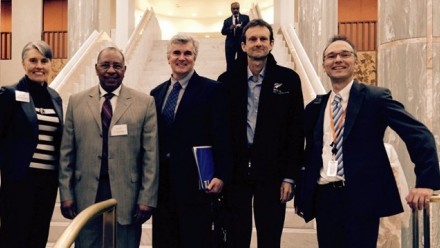Intergovernmental Panel on Climate Change appoints two ANU researchers to its synthesis report team
Two ANU researchers, Prof Frank Jotzo and Prof Mark Howden, have been appointed to respectively write and review the Intergovernmental Panel on Climate Change (IPCC) Synthesis Report for the Sixth Assessment Report (AR6), the document that integrates all IPCC reports in the Sixth Assessment cycle.
The role of the IPCC is to bring together scientific understanding of all aspects of climate change for the governments of the world. The Synthesis Report is the single most read document produced by the IPCC.
"The AR6 Synthesis Report is designed to provide the most compact, robust and relevant report possible on climate change issues for policymakers worldwide”, said Prof Howden, Director of the ANU Climate Change Institute. “It’s testament to the strength of ANU climate change expertise that two out of the 39-strong global core writing team are based here at ANU.”
Prof Jotzo, of the Crawford School of Public Policy, highlighted the scale of the challenge in producing the Synthesis Report. “It’s a huge task to provide integration across science, impacts and emissions reductions so that the main insights stand out,” he said. “The IPCC reports contain an avalanche of detail that matters but goes below the radar of decision makers. The Synthesis Report is vital as it will be only IPCC document that many decision makers read.”
Prof Howden, who is the IPCC’s longest standing participant, emphasised that the IPCC is increasingly recognising the need for more integrated climate change solutions which bring together emissions reduction, climate adaptation and the Sustainable Development Goals.
“For the first time AR6 puts climate change responses in the context of broader Sustainable Development Goals, which means that increasing attention needs to be paid to adoption pathways and institutional responses”, said Prof Howden.
Prof Jotzo highlighted three trends in relation to emission-reduction. “Firstly, new knowledge on climate change mitigation is now largely based on real world practical examples, rather than theory. Secondly, governments are using a wide variety of policy instruments to address climate change - this is a function of their economic, social and political contexts. Thirdly, the cost of zero emissions technologies has fallen so that many of them are now becoming competitive with high carbon alternatives.”
“Existing impacts of climate change and responses to these have meant that climate adaptation also has moved out of the theoretical and into the practical domains, meaning that the IPCC can start to synthesise climate adaptation options so that we can evaluate what works, when and why,” said Prof Howden.
The AR6 Synthesis Report is scheduled to be released in May 2022, in time to inform 2023 global climate negotiations, when countries will review progress towards Paris Climate Agreement goals, including limiting global warming to well below 2°C.
Prof Howden is currently a Vice Chair of IPCC Working Group II and has had numerous other IPCC roles since 1991. Prof Jotzo was a Lead Author on the IPCC’s Fifth Assessment Report (AR5) and is a Lead Author of AR6. The Synthesis Report core writing team includes one other Australian author, Prof Malte Meinshausen, who is based at the University of Melbourne.
Find out more at https://www.ipcc.ch/2020/07/21/ar6syr-corewritingteam/











